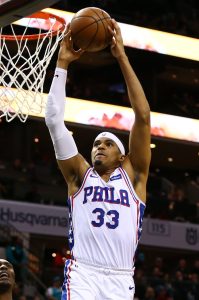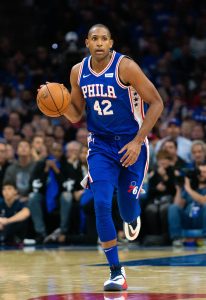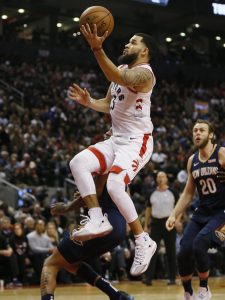Hoops Rumors is breaking down the 2019 offseason for all 30 NBA teams, revisiting the summer’s free agent signings, trades, draft picks, departures, and more. We’ll evaluate each team’s moves from the last several months and look ahead to what the 2019/20 season holds for all 30 franchises. Today, we’re focusing on the Philadelphia 76ers.
Signings:
- Standard contracts:
 Tobias Harris: Five years, $180MM. Includes trade kicker of 5% or $5MM (whichever is lesser). Re-signed using Bird rights.
Tobias Harris: Five years, $180MM. Includes trade kicker of 5% or $5MM (whichever is lesser). Re-signed using Bird rights.- Al Horford: Four years, $109MM. Fourth year partially guaranteed ($14.5MM). Signed using cap room.
- Note: Horford’s fourth-year partial guarantee can increase to $19.5MM (if Sixers make Finals in 2020, 2021, or 2022) or can fully guarantee to $26.5MM (if Sixers win Finals in 2020, 2021, or 2022).
- Mike Scott: Two years, $9.77MM. Signed using room exception.
- Shake Milton: Four years, minimum salary. Fourth-year team option. Converted from two-way contract to standard contract using cap room.
- James Ennis: Two years, minimum salary. Second-year player option. Re-signed using minimum salary exception.
- Furkan Korkmaz: Two years, minimum salary. Second year non-guaranteed. Re-signed using minimum salary exception.
- Raul Neto: One year, minimum salary. Signed using minimum salary exception.
- Kyle O’Quinn: One year, minimum salary. Signed using minimum salary exception.
- Trey Burke: One year, minimum salary. Partially guaranteed ($405K). Signed using minimum salary exception.
- Note: Guarantee increased to $810K at start of regular season.
- Two-way contracts:
- Non-guaranteed camp contracts:
Trades:
- Acquired the draft rights to Matisse Thybulle (No. 20 pick) from the Celtics in exchange for the draft rights to Ty Jerome (No. 24 pick) and Carsen Edwards (No. 33 pick).
- Acquired cash ($2MM) from the Wizards in exchange for Jonathon Simmons and the draft rights to Admiral Schofield (No. 42 pick).
- Acquired Josh Richardson in a four-team trade with the Heat, Clippers, and Trail Blazers in exchange for Jimmy Butler (sign-and-trade; to Heat) and the draft rights to Mathias Lessort (to Clippers).
- Acquired the draft rights to Jordan Bone (No. 57 pick), the Hawks’ 2020 second-round pick (56-60 protected), and either the Hawks’, Hornets’, or Nets’ 2023 second-round pick (whichever is most favorable) from the Hawks in exchange for the draft rights to Bruno Fernando (No. 34 pick).
- Acquired the Heat’s 2024 second-round pick (top-55 protected) and cash ($2MM) from the Pistons in exchange for the draft rights to Jordan Bone (No. 57 pick).
Draft picks:
- 1-20: Matisse Thybulle — Signed to rookie contract.
- 2-54: Marial Shayok — Signed to two-way contract.
Contract extensions:
- Ben Simmons: Five years, 25% maximum salary. Projected value of $168,200,000. Starting salary can be worth up to 30% of the cap if Simmons earns All-NBA honors in 2020 (full details). Includes 15% trade kicker. Starts in 2020/21; runs through 2024/25.
Departing players:
Other offseason news:
Salary cap situation:
- Used cap space; now over the cap.
- Carrying approximately $128.39MM in salary.
- No cap exceptions available.
Story of the summer:
No team had a more crushing end to its 2018/19 campaign than the Sixers, who would have forced overtime and been in position to eke out a second-round series win over the Raptors if Kawhi Leonard‘s miracle Game 7 buzzer-beater hadn’t dropped in after bouncing four times on the rim.
As heartbreaking as that finish was for Philadelphia, the team had to be encouraged by the Raptors’ subsequent wins over the Bucks in the Eastern Finals and the Warriors in the NBA Finals. Neither of those teams forced Toronto to a seventh game, meaning it was Philadelphia that actually gave the eventual champs their biggest scare.
The Sixers appeared to take that silver lining to heart. Rather than buying into theories that the Ben Simmons/Joel Embiid pairing might not work in the long run, the team doubled down on that duo, signing Simmons to a five-year, maximum-salary contract extension. And despite some disappointing postseason showings from Tobias Harris, the 76ers heavily invested in the veteran forward, re-signing him to a five-year, $180MM deal.
Philadelphia likely would’ve been willing to run it back to an even greater degree by retaining Jimmy Butler, but he decided he wanted to head to South Beach, choosing the Heat in free agency. Fortunately for the Sixers, Miami didn’t have the cap room necessary to sign Butler outright and had to cooperate on a sign-and-trade, giving the 76ers the leverage to acquire Josh Richardson in the process.
Then, rather than bringing back sharpshooter and floor-spacer J.J. Redick, the Sixers opted to use their newly-opened cap room to bring aboard Al Horford, a veteran capable of either playing alongside Embiid or stabilizing the team’s defense when the All-NBA center is off the floor.
With Richardson and Horford replacing Butler and Redick in the starting lineup, the 76ers lost a little outside shooting and play-making, but potentially made a strong defense even stronger.
Philadelphia’s size flummoxed just about every Raptors player not named Kawhi Leonard during the Eastern Conference Semifinals, and this year’s starting five – Simmons, Richardson, Harris, Horford, and Embiid – is even bigger. After just missing out on a deep postseason run in 2018/19, the Sixers have gone all-in on their biggest strength for 2019/20.
Read more
Key offseason losses:
Butler’s 18.2 PPG during his 55 regular season games in Philadelphia would have been his lowest mark since the 2013/14 season. However, that was more a result of sharing the floor with so many other talented scorers than a sign of declining effectiveness. When both teams’ offenses bogged down in that playoff series against Toronto, Butler was one of the few players on the court capable of creating shots and making plays, a skill set the Sixers will miss.
Redick’s reliable outside shooting will also be missed. A 41.2% career shooter from beyond the arc, Redick made a career-best 3.2 threes per game in 2018/19, forcing opposing defenders to chase him all over the floor to avoid letting him get free for even a second.
Still, while the 76ers may struggle to replace his three-point shooting, Redick was perhaps the only member of the starting group who didn’t have the size and length necessary to create nightmares for opposing scorers. Although his departure removes an offensive threat, it could give the club some extra switching options on defense.
The other departing Sixers were bench players, though McConnell deserves to be singled out for his four seasons with the franchise. He endured a couple ugly years during the rebuild before evolving into a reliable backup point guard for a contender.
Big men Boban Marjanovic, Amir Johnson, and Greg Monroe thrived in certain matchups, but the Sixers had to pick their spots in order to avoid asking them to do too much. Jonathon Simmons, part of the return in the Markelle Fultz trade, was decent down the stretch but fell out of the rotation in the postseason.
Key offseason additions:
 The Sixers’ signing of Horford made sense for both the team and the player. For Horford, joining the 76ers represented a chance to contend for a title, maximize his earnings, and see more time at power forward, his preferred position. For Philadelphia, it meant securing an insurance policy for Embiid.
The Sixers’ signing of Horford made sense for both the team and the player. For Horford, joining the 76ers represented a chance to contend for a title, maximize his earnings, and see more time at power forward, his preferred position. For Philadelphia, it meant securing an insurance policy for Embiid.
Even if Embiid manages to stay healthy all season – which certainly isn’t a sure thing – the Sixers struggled when he went to the bench, posting a -3.5 net rating during the regular season. Those numbers got even worse during the playoffs — and became downright comical vs. the Raptors in round two. Philadelphia had a +18.6 net rating in the 237 minutes Embiid played against Toronto and a -52.5 net rating in the 99 minutes he sat. That was the season right there.
In Horford, the Sixers get a two-way difference-maker who will make the right play on offense and won’t let the defense fall apart when Embiid isn’t out there.
Richardson is the other new starter and was a nice get for the Sixers, as he’ll be under contract for at least two more seasons at a reasonable price. It was just a year ago that the Heat balked at including him in a deal for Butler. They changed their stance this summer after Richardson’s shooting efficiency slipped in 2018/19, but as a secondary play-maker and scorer in Philadelphia, it wouldn’t be a surprise to see Richardson get those numbers back closer to where they were in 2017/18 (.451/.378/.845). And while he might not be the defender Butler is, the drop-off isn’t substantial.
The Sixers’ offseason focus on defense was also reflected in their first-round draft pick, Matisse Thybulle. The two-time Pac-12 Defensive Player of the Year posted eye-popping numbers during his final year at Washington, averaging 3.5 steals per game to go along with 2.3 blocks. Although he probably won’t match those numbers at the NBA level, the viral clips of Thybulle’s defensive highlights early in his rookie season suggest he’s going to be just fine going up against the best scorers in the world.
The Sixers also added Trey Burke, Raul Neto, and Kyle O’Quinn on minimum-salary deals for depth purposes. They likely won’t see major minutes if the team’s primary rotation players stay healthy.
Outlook for 2019/20:
Depending on how you feel about Giannis Antetokounmpo‘s supporting cast in Milwaukee, you could make a strong case that the Sixers have the best starting lineup and rotation in the East.
While it might take a couple in-season tweaks – including adding a shooter – for Philadelphia to maximize its ceiling, it’s hard to imagine this team not finishing at or near the top of the conference and winning a couple playoff series in the East. If it all comes together and the 76ers have some good health luck, an appearance in the NBA Finals may even be in the cards.
Salary information from Basketball Insiders was used in the creation of this post. Photos courtesy of USA Today Sports Images.
 Fred VanVleet, Raptors, 25, SG (Up) – Signed to a two-year, $18MM deal in 2018
Fred VanVleet, Raptors, 25, SG (Up) – Signed to a two-year, $18MM deal in 2018
 The Sixers’ signing of Horford made sense for both the team and the player. For Horford, joining the 76ers represented a chance to contend for a title, maximize his earnings, and see more time at power forward, his preferred position. For Philadelphia, it meant securing an insurance policy for Embiid.
The Sixers’ signing of Horford made sense for both the team and the player. For Horford, joining the 76ers represented a chance to contend for a title, maximize his earnings, and see more time at power forward, his preferred position. For Philadelphia, it meant securing an insurance policy for Embiid.